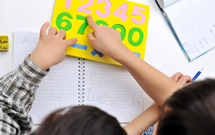Numbers, counting, and low-level arithmetic are three basic competencies that are vital to later success in math, and students should have these key math skills in first grade in order to be successful in math in fifth grade, according to a long-term study released by psychologists at the University of Missouri (UM).
“Math is critical for success in many fields, and the United States is not doing a great job of teaching math,” David Geary, UM’s Curator’s Professor of Psychological Sciences, who led the research team, said in a statement. “In order to improve basic instruction, we have to know what to instruct.”
Researchers monitored 177 elementary students from 12 different elementary schools from kindergarten to fifth grade, and intend to continue monitoring them through high school. Students who understood the number line and some basic math facts in the beginning of first grade showed faster growth in math skills over the next five years.
“It is important that children understand the meaning of Arabic numerals, that is, the quantities they represent and be able to quickly translate quantities into numerals and numerals into quantities. [The study] also highlights the importance of knowing basic facts and the number line,” Geary said.
Teachers and parents can incorporate the results of this study into their math instruction to build long-term math skills and success in math.
“Don’t assume children understand quantities and numerals, even if they can count by rote or identify numerals,” said Geary. “Question them and give them a lot of practice and experience with numbers, the number line, and solving basic addition and subtraction problems.”
To measure math success, the study used a mathematical achievement test, Numerical Operations, which focuses on computational arithmetic such as fractions and decimals. Performance on the Numerical Operations test has been highly correlated with performance on more difficult tests involving word problems, measurement, simple geometry, and statistics items.
In light of these correlations, achievement differences based on first grade math skills may have implications far beyond success in fifth grade math studies. Students who do well in fifth grade math may be likely to do well in math in later years too.
“This study reinforces the idea that math knowledge is incremental, and without a good foundation, a student won’t do well because the math gets more complex,” Geary said.
Although heritable intellectual ability certainly affects academic achievement, “a substantial portion of individual differences in children’s mathematics achievement cannot be explained by general intelligence,” the report said.
The study isolated the contributions of the three key areas of competence—numbers, counting, and arithmetic—to later success in math by controlling for general cognitive abilities such as intelligence, working memory, and processing speed.
While similar studies have been conducted on the effects of early reading skills on later reading success, Geary says this study is the first to focus on the effects of early math skills. The study did not find significant correlation between early math skills and future reading ability.
The paper, “Cognitive Predictors of Achievement Growth in Mathematics: A Five Year Longitudinal Study,” will be published in the journal Developmental Psychology.
